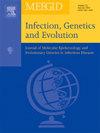Full-length sequence determination and isolation of infectious particles of an atypical porcine pestivirus from wild boars in Ishikawa Prefecture, Japan
IF 2.6
4区 医学
Q3 INFECTIOUS DISEASES
引用次数: 0
Abstract
Atypical porcine pestivirus (APPV), the causative agent of congenital tremor (CT) type A-II, is a single-stranded (+) RNA virus classified in the genus Pestivirus of the family Flaviviridae that infects domestic pigs and wild boars. While surveys and studies on APPV infection in pigs are ongoing, information on APPV in wild boars is lacking. In Japan, there have been no reports of APPV infection in wild boars. We therefore screened serum samples from 333 wild boars to determine the prevalence of APPV in Ishikawa Prefecture. APPV-RNA was detected in two samples, and the complete viral genome was sequenced from one of these samples. Infectious particles were isolated from the same serum sample. Phylogenetic analysis classified the APPV detected in wild boars as genotype 3, which is consistent with the genotype previously reported in Japanese domestic pigs. Replication kinetics assays showed that wild boar-derived APPV exhibited lower replication efficiency than pig-derived APPV, although this efficiency improved with successive passaging of infected cells. The complete APPV sequence and infectious particles obtained from wild boar-derived serum for the first time in Japan are considered useful for future research on APPV.
日本石川县野猪非典型猪瘟病毒感染颗粒的全序列测定和分离
非典型猪瘟病毒(APPV)是一种单链(+)RNA病毒,属于黄病毒科猪瘟病毒属,可感染家猪和野猪,是导致先天性震颤(CT) a - ii型的病原体。虽然正在对猪流行性肠胃炎病毒感染进行调查和研究,但关于野猪流行性肠胃炎病毒感染的信息缺乏。在日本,没有野猪感染APPV的报告。因此,我们筛选了333头野猪的血清样本,以确定石川县APPV的流行情况。在两个样本中检测到APPV-RNA,并对其中一个样本进行了完整的病毒基因组测序。从同一血清样本中分离出感染性颗粒。系统发育分析表明,在野猪中检测到的APPV为基因型3,这与先前在日本家猪中报道的基因型一致。复制动力学分析表明,野猪源性APPV的复制效率低于猪源性APPV,尽管这种效率随着感染细胞的连续传代而提高。日本首次从野猪血清中获得完整的猪流行性感冒病毒序列和感染颗粒,对进一步研究猪流行性感冒病毒具有重要意义。
本文章由计算机程序翻译,如有差异,请以英文原文为准。
求助全文
约1分钟内获得全文
求助全文
来源期刊

Infection Genetics and Evolution
医学-传染病学
CiteScore
8.40
自引率
0.00%
发文量
215
审稿时长
82 days
期刊介绍:
(aka Journal of Molecular Epidemiology and Evolutionary Genetics of Infectious Diseases -- MEEGID)
Infectious diseases constitute one of the main challenges to medical science in the coming century. The impressive development of molecular megatechnologies and of bioinformatics have greatly increased our knowledge of the evolution, transmission and pathogenicity of infectious diseases. Research has shown that host susceptibility to many infectious diseases has a genetic basis. Furthermore, much is now known on the molecular epidemiology, evolution and virulence of pathogenic agents, as well as their resistance to drugs, vaccines, and antibiotics. Equally, research on the genetics of disease vectors has greatly improved our understanding of their systematics, has increased our capacity to identify target populations for control or intervention, and has provided detailed information on the mechanisms of insecticide resistance.
However, the genetics and evolutionary biology of hosts, pathogens and vectors have tended to develop as three separate fields of research. This artificial compartmentalisation is of concern due to our growing appreciation of the strong co-evolutionary interactions among hosts, pathogens and vectors.
Infection, Genetics and Evolution and its companion congress [MEEGID](http://www.meegidconference.com/) (for Molecular Epidemiology and Evolutionary Genetics of Infectious Diseases) are the main forum acting for the cross-fertilization between evolutionary science and biomedical research on infectious diseases.
Infection, Genetics and Evolution is the only journal that welcomes articles dealing with the genetics and evolutionary biology of hosts, pathogens and vectors, and coevolution processes among them in relation to infection and disease manifestation. All infectious models enter the scope of the journal, including pathogens of humans, animals and plants, either parasites, fungi, bacteria, viruses or prions. The journal welcomes articles dealing with genetics, population genetics, genomics, postgenomics, gene expression, evolutionary biology, population dynamics, mathematical modeling and bioinformatics. We also provide many author benefits, such as free PDFs, a liberal copyright policy, special discounts on Elsevier publications and much more. Please click here for more information on our author services .
 求助内容:
求助内容: 应助结果提醒方式:
应助结果提醒方式:


